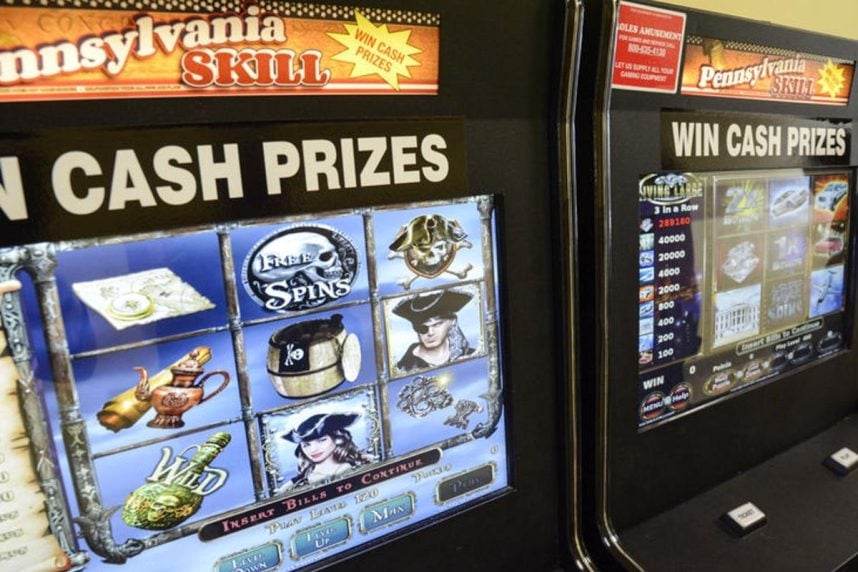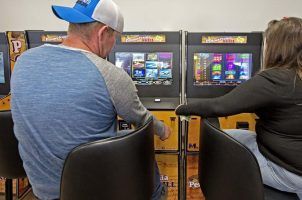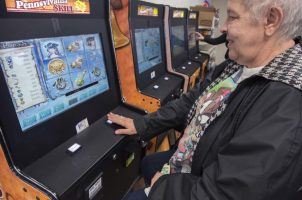Pennsylvania Skill Gaming Legislation Forthcoming to Regulate Machines
Posted on: April 12, 2023, 08:51h.
Last updated on: April 12, 2023, 01:03h.
Pennsylvania skill gaming machines continue to multiply inside restaurants and bars across the commonwealth. One state Senator says it’s long past due that the state legalizes the controversial gaming terminals in order to protect consumers and generate tax revenue.

Skill gaming machines look, sound, and function similarly to Las Vegas-style slot machines. But they come with one major difference in that the player must identify a winning payline compared with a traditional slot machine that automatically pays out on a winning spin.
The “skill” element of recognizing winning lines, supporters of the currently unregulated and untaxed machines say, renders the apparatuses immune from the Pennsylvania Gaming Act. The state’s commercial gaming law only regulates legal gaming machines.
Several state judges have ruled in agreement with the skill gaming interests in that the products are games of skill and therefore fall outside the scope of the gaming law.
The legal status of skill gaming machines continues to be challenged in court. The Pennsylvania Lottery and the state’s regulated gaming interests want skill games deemed illegal.
The casinos argue that with skill gaming machines in most cities and towns, gamblers wishing to play a slot machine no longer have to travel to one of their 17 land-based casinos. The casinos are also furious that while their state-issued gaming licenses cost tens of millions of dollars and their operations are subject to considerable taxes and fees, the skill interests paid $0 to enter the state gaming market.
Skill Gaming Bill
State Sen. Gene Yaw (R-Williamsport) says there’s enough gaming money to go around to support both the current legal gaming industry and the unregulated skill gaming market.
“Critics opine that skill games take money away from the state’s lottery and casinos, but the facts simply do not support this assertion,” Yaw tweeted this week in reference to Pennsylvania’s legal gaming interests generating a record $5.2 billion in gross revenue last year.
In a memo to his Harrisburg colleagues, Yaw this week says he’s finalizing legislation to legalize, regulate, and tax the skill gaming machines.
Pennsylvania’s skill game terminals are manufactured right here in Lycoming County and the finished products exist in fraternal clubs, veterans’ organizations and taverns, as well as other local businesses throughout the commonwealth,” Yaw said. “Skill games are a piece of the small business economy in our state, and it’s time we recognize the benefits of this emerging industry and offer regulatory support, so that we can ensure it flourishes — safely and responsibly.”
Estimates suggest there are as many as 70K skill gaming machines currently operating in the commonwealth. Yaw believes regulating and taxing the machines could generate upwards of $300 million annually in new tax revenue for the state and counties where the devices operate.
“It’s like we have a winning lottery ticket here,” Yaw added. “Why not cash it and take advantage of it?”
If you want to know why skill games are important, just walk into a neighborhood market in western Pennsylvania. Or visit a family-owned restaurant in Lebanon County. Or a VFW in Bucks County. Or a convenience store in Indiana County.
— Senator Gene Yaw (@SenatorGeneYaw) April 10, 2023
Ongoing Lawsuit
Late last month, an appeal to the Pennsylvania Supreme Court was filed on behalf of six brick-and-mortar casinos. The appeal asks the state’s highest court to reconsider a 2019 ruling from Commonwealth Court Judge Patricia McCullough that concluded certain skill gaming machines are not governed by the Gaming Act, and therefore, cannot be seized by law enforcement.
McCullough’s ruling provided a sense of immunity for skill gaming machines manufactured by Pace-O-Matic (POM). The Georgia-based manufacturer is behind the popular Pennsylvania Skill terminals.
The Pennsylvania Supreme Court hasn’t yet announced whether it will take up the matter.
Related News Articles
Pennsylvania Skill Gaming Bill Receives Testimony From Casino Lobby
Most Popular
Mirage Las Vegas Demolition to Start Next Week, Atrium a Goner
Where All the Mirage Relics Will Go
Most Commented
-
Bally’s Facing Five Months of Daily Demolition for Chicago Casino
— June 18, 2024 — 12 Comments -
Chicago Pension Mess Highlights Need for Bally’s Casino
— July 2, 2024 — 5 Comments
















Last Comments ( 8 )
Oh and this club is ran on a LAN that consist of that establishment only some machines now have progessives that are built up by a network that reaches outside that buisness and is connected to the same cabinet models exchanging jnformation. I didn't wanna get someone trying to use that as an excuss to keep pushing this it takes 600k to get a 6k progressive jackpot
Okay reading a lot of these comments people seem to be confused there id a 6k progressive right down the street from me in a club. That club has not seen 600k in deposited money and that is just one usually over 2 or 3 months you can see one or multiple games go between 3k and up usually then the jackpots get hit ive seen the statisic screen tbe print outs are even by the door. You can plah these games with skill unfortunately mele or PA skill patched out when the machines would change all the puzzles no matter the bet at every button push that no longer exist but the skill comes from patience if you watch other people play that is when you have to decìde whether you jump in or out especially depends on who you see walk away with tickets and large patouts. Just today between 12 and 4pm that club down the street paid out over 4k in prizes i watched one guy get 1k just from one round of "free spin" bonuses and he was maybe playing for 2 or 3 mins before I walked over does this happen all the time no it is vary rare where you are going to have every machine paying out hundreds to thousands of dollars in non jackpot prizes im going to keep it to myself on why or how. I did about 900 to 1k in prizes and another guy did 800 on one game and them pulled another 400 out hitting the 2nd progressive. There were a few other cash outs for 200 and up while i was still there. It is random you have to watch and pay attention the skill in the actual game is non existent really anymore(execpt the bonus games) it is knowing when to play, what to play and where to play. I have family in the coin op buisness and have watched these games since the beginning of them they are something to do wĥen bored or to kill some time but anyone playing that hard already had, has or is susceptible to addiction let alone gambling. These machines like any other is to make a profit and sometimes guess what they dont I've seen buisnesses be in the negative for months. Granted there is plenty of arguments for why these are or are not "skill" based games or whether you take that into account if they should continue or be forced to change the way they play or operate
You dont know what you are talking about and that isnt how the progressive jackpots work on these machines at all. Go find a new job or get better at reseaching because you are really bad almost pathetic at lying
Herb you are completely full of crap! Do you know how they work? Mele is the only manufacturer inside Pennsylvania. According to law manufacturers of these machines spend a fee $400,000 in order to receive manufacturer status! Mele then leases the machines to licensed vendors! The agreement is $10,000 for (X) amount of play. Once thst much play is used up the machine says (out of plays) and the vendor must pay Mele another $10,000 for more play! This means the player is paying for the profits for the owner of the establishment, the vendor and Mele! Now I am only referring to the PA skills machines with Living large, Perrywinkle, Grave yard gold ect ect! I'm not referring to the other taller machines with the various other games! Vendors are required by Mele to keep the software up to date on their machines of they will not operate! This puts Mele in control of everything in regards to how the machine plays! Clicking View Next screen by no means changes how the game plays or adds skill to the game! Sure sure you can go and check every puzzle on every bet level on every game and ONLY play when someone left something good. However that's not realistic and is by no means skill! Or you can copy the patterns and win Penny's which takes a ridiculous amount of time and is impossible to win more then maybe a dollar or two! Mele is also trying to claim only their machines are skill games and no other games are! Regardless what games they are, there's little to no skill involved and no one can win every time!! Let's do some math. The jackpots start at $1000 or $2,000. It's shown in Penny's! So100,000 or 200,000. The main progressive jackpot increases by 2 cents for every 4 of play! Let's say the jackpot is $4000. Meaning the jackpot has increased by 200,000 Penny's! Meaning the machine goes thru $400,000 worth of play for that jackpot to reach $4,000 dollars! That's 100,000 plays at $4 each increasing at 2 cents per play! Let's say the machines have several jackpot up over $3,000 or $4,000! That's millions of dollars of play to reach those numbers! Mele gets their $10,000 for every (x) amount of play, the vendor and Store owner split the rest of the profits! Let's take $400,000 and subtract 2k. $398,000. 90% of that is $358,200 leaving almost $40,000 for the vendor, Mele and store owners profits. We know Mele is taking $10,000 for (X) amount of play! I've seen places that get that much play in a week so let's say 50k in play. That's $80,000 Mele takes in order for that machine to reach a $4,000 jackpot! Then the vendor and store owner need to make money. Figure they each make 5k a week on average per machine in a busy place! Let's say it takes 12 weeks for the machine to reach $4,000 jackpot on one game! That's $200,000 of the 400,000 the machine took in to reach that jackpot. Now of course there are wins in-between. Winning a dollar or $4 or 40 or 500 or 2688 which is the max bonus payout! Over all the machines are paying maybe 50% of what they take in. Considering Mele takes 10k for every (X) amount of play and the vendor and store owner also need to make a cut, the machines at the very best are paying out(actual money cashed in) maybe 30%! Meaning if you sat there and put $100,000 into a machine you would probably get around $30k back! I don't see where the skill is involved there! What sq you pick has no outcome on what the next spin will be. It's already pre-determined. It's the same with the bonus spins. It's predetermined how much your going to win. What you pick is irrelevant. It's it's meant to be a ×5 win or a ×100 win that's what it will be!
Saturation is overwhelming they need regulated and reduced the operators need a maximum machine count they are literally in every type of establishment now they’re creating skill rooms with nothing in their big machines. Let’s get these things regulated and reduced for everyone positive story, I guarantee you there’s a negative story about a player who lost everything they own. Let’s also offer something in the way of addiction, the casinos are offering it, why doesn’t the skill industry offer it?
Mike and Todd must be pseudonyms for Beavis and Butthead, because they're glaringly ignorant. The skill games are proven games of skill. The fact that people make a profit on a game of skill is based on low skill players playing the game. Carnival games at a fair are games of skill, yet there's noone decying the dime pitch, ring toss, etc. These games of skill are literally proven to have a positive payout on every single play, if the player plays perfectly. The net payout would be time consuming, boring, etc. However that fact is not the point - skill can overcome all elements of chance and it is not overbearing. You can get addicted to the dime toss and ring toss, and you have no control over the wind speed when you toss. These arguments are farcical. And not everyone has the motor skill to make carnival games anything more than a game of chance. Regulation makes sense, but banning does not.
PA skills games are not skills games. You have no control over what the next spin will be. It's predetermined depending on the algorithms. There take algorithms, payout algorithms, and break even algorithms! The only way to regulate these machines is by forcing all licensed vendors and owners of this machines to turn in their numbers. Money in, money bet, money cashed out! There's also ways to make the machines not play how their intended! Capping jackpots often causes machines to not hit them as regularly. They say these machines pay out 90% but the reality is some pay as little as 50-60%! If you're going to regulate them they must be set to a minimum pay out percentage! Say 85%. Anyone caught setting their machines lower get charged with theft by deception as they are advertising on the machines these max payouts and jackpots can hit. While in reality they don't hit! I've seen machines take in over 100,000 and never hit a $2500 jackpot! Touching the screen isn't a skill. Understanding a machine set to pay out 90% will hit when the numbers reach a certain point is a skill. The problem is that can be done with any video slot regardless if you're required to tap the winning line or not. If anything having to tap the winning line gives the house a larger advantage as there's no directions on how to play the machines and it's very possible for someone to get distracted and miss a $400-$progressive jackpot. Maybe they hit the button and their phone rings and they must answer it. Next thing they know there's 2 diamonds in a row and it timed out! The fact that type physical reaction time discriminates against those with physical disabilities also violates the disabilities act of 1996. As it's not fair for all individuals! As not all individuals have the cognitive abilities and physical abilities to accomplish such a task! You're casino attorneys need someone like my self who knows exactly how to defeat these judges rulings lmao.
Regardless of the tax revenue, these Pennsylvania skills machines bring gambling addiction and financial chaos to every locale in the Commonwealth. As a result, family homes often become broken homes. Skills machines should be declared as illegal before they inflict more chaos on every town in Pennsylvania!